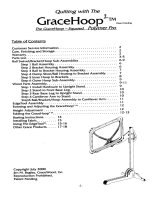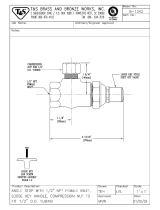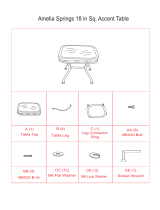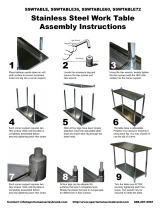Page is loading ...

!
OPERATOR’S MANUAL
HM126-MY2020: Rev B
Publication Date: 19-Feb-2020
HM126 PORTABLE SAWMILL
9.5 and 14 Horsepower Models

!
This page intentionally left blank.

HM126 Operator’s Manual
TABLE OF CONTENTS
Space
TABLE OF CONTENTS 1_______________________________________
INTRODUCTION 4_____________________________________________
INTENDED USE 4_____________________________________________
SAFETY GUIDELINES 5________________________________________
WORK AREA 6__________________________________________________
INTERNAL COMBUSTION ENGINE SAFETY 6_________________________
PERSONAL SAFETY 7____________________________________________
TOOL USE AND CARE 8__________________________________________
EQUIPMENT OPERATION 9________________________________________
MAINTENANCE 10_______________________________________________
TECHNICAL SPECIFICATIONS 11________________________________
OVERALL DIMENSIONS 12________________________________________
ASSEMBLY 13________________________________________________
1. TOOLS REQUIRED 13_________________________________________
2. UNPACKING 14_______________________________________________
3. TRACK 15___________________________________________________
4. LOG CLAMP AND SUPPORTS 19________________________________
5. SAWMILL HEAD ASSEMBLY 22__________________________________
FRONT POSTS 22 _________________________________________________
CARRIAGE LEGS 23 ______________________________________________
HEAD LOCK-DOWN PLATES 24 ____________________________________
STANDING THE SAWHEAD UPRIGHT 25 ____________________________
REAR POSTS 26 __________________________________________________
CROSS BEAM 27 _________________________________________________
LUBRICATION TANK 29 ____________________________________________
DASHBOARD & HOUR METER 30 __________________________________
LIFT MECHANISM 32 ______________________________________________
LIFT CABLE ROUTING 34 __________________________________________
LOG SCALE 36 ___________________________________________________
HM126-MY2020: Rev B
Page of 1 92
19-Feb-2020

HM126 Operator’s Manual
PUSH HANDLE 39 ________________________________________________
THROTTLE HANDLE AND CABLE 41 ________________________________
BAND WHEEL DOOR LATCHES 43 __________________________________
LUBRICATION TUBING 44 _________________________________________
TIGHTEN CARRIAGE WHEEL BOLTS 46 _____________________________
6. PLACING THE HEAD ON THE TRACK 47__________________________
METHOD 1 47 ____________________________________________________
METHOD 2 48 ____________________________________________________
ROLLING THE SAWMILL HEAD ASSEMBLY 49 _______________________
RAISING & LOWERING THE SAWHEAD 50 ___________________________
LEVELLING THE SAWMILL HEAD ASSEMBLY 51 _____________________
GREASING THREADS 52 __________________________________________
ENGINE OIL 53 ___________________________________________________
DIRECTION OF CUT 55_________________________________________
SAWMILL SET-UP PROCEDURES 56_____________________________
DRIVE BELT TENSION 56_________________________________________
BLADE TENSION 58______________________________________________
BLADE TRACKING 59____________________________________________
REDUCING THE BLADE TENSION 60 _______________________________
ADJUSTING THE FOLLOWER SIDE TRACKING 61 ____________________
BLADE GUIDE ADJUSTMENT 63____________________________________
SAWMILL MAINTENANCE 65____________________________________
CHANGING THE BLADE 65________________________________________
REPLACING BELTS 66____________________________________________
TROUBLESHOOTING 69_______________________________________
PARTS LIST 70_______________________________________________
EXPLODED ASSEMBLY VIEWS 76_______________________________
TRACK 76______________________________________________________
SAWHEAD—14 hp 77_____________________________________________
SAWHEAD—9.5 hp 78____________________________________________
BACK BEAM—14 hp 79___________________________________________
HM126-MY2020: Rev B
Page of 2 92
19-Feb-2020

HM126 Operator’s Manual
BACK BEAM—9.5 hp 80___________________________________________
GUIDE BLOCKS 81_______________________________________________
BAND WHEEL HOUSING 82_______________________________________
BAND WHEEL HOUSING DOORS 83________________________________
BAND WHEELS AND BELT TENSIONER 84___________________________
ENGINE COMPONENTS—14 hp 85__________________________________
ENGINE COMPONENTS—9.5 hp 86_________________________________
CARRIAGE 87___________________________________________________
CARRIAGE LEG, WHEEL, AND SWEEPER 88_________________________
LIFT MECHANISM 89_____________________________________________
THROTTLE HANDLE 90___________________________________________
CABLES, TUBING & LABELS 91____________________________________
NOTES 92___________________________________________________
HM126-MY2020: Rev B
Page of 3 92
19-Feb-2020

HM126 Operator’s Manual
INTRODUCTION
Congratulations on your purchase and welcome to Woodland Mills! This manual gives you the
necessary information about your machine so you will be able to use it properly. The entire
manual must be read and understood before you start using the machine. If any questions
should arise that are not covered by this manual, please contact Woodland Mills Inc.
This machine is designed for certain applications only. We strongly recommend that this
machine is not modified and/or used for any application other than that for which it was
designed. If you have any questions relative to a particular application, DO NOT use the
machine until you have first contacted us to determine if it can or should be performed on the
product.
For technical questions and replacement parts, please contact Woodland Mills Inc.
INTENDED USE
Woodland Mills wood sawmills are designed for acreage owners to aid in the milling of natural,
untreated wood with the mill firmly supported on the ground. Materials that are processed may
contain chemicals or by-products that could corrode the machine or damage it, resulting in
safety concerns.
"
"
"
"
OWNER'S RECORD
"
"
Please take a moment to record the following information about your sawmill. If you
need to call for assistance, please be ready to provide your model and serial numbers.
This information will allow us to help you more quickly when you call.
"
"
"
"
MODEL NUMBER
"
"
"
"
"
"
"
"
SERIAL NUMBER
"
"
"
!
"
"
"
"
DATE OF PURCHASE
"
"
"
"
"
"
"
HM126-MY2020: Rev B
Page of 4 92
19-Feb-2020

HM126 Operator’s Manual
SAFETY GUIDELINES
**SAVE THESE INSTRUCTIONS**
HM126-MY2020: Rev B
Page of 5 92
19-Feb-2020
Read and understand all instructions. Failure to follow all instructions
listed below may result in electric shock, fire, and/or serious injury.
WARNING!
The warnings, cautions, and instructions discussed in this instruction
manual cannot cover all possible conditions or situations that could
occur. It must be understood by the operator that common sense and
caution are factors which cannot be built into this product but must be
supplied by the operator.
WARNING!
Only operate the engine in a well ventilated area. Carbon Monoxide
(CO) produced by the engine during use can kill. Do not use indoors,
near windows, or in other sheltered areas.
NOTE: All Federal and State laws and any regulation having
jurisdiction covering the safety requirements for use of the machine
take precedence over the statements in this manual. Users of this
machine must adhere to such regulations.
WARNING!

HM126 Operator’s Manual
WORK AREA
•
Keep work area clean, free of clutter and well lit. Cluttered and dark work areas can
cause accidents.
•
Do not use your sawmill where there is a risk of causing a fire or an explosion; e.g. in
the presence of flammable liquids, gasses, or dust. Power tools create sparks which may
ignite the dust or fumes.
•
Keep children and bystanders away while operating a power tool. Distractions can cause
you to lose control, therefore, visitors should remain a safe distance from the work area.
•
Be aware of all power lines, electrical circuits, water pipes and other mechanical hazards in
your work area, particularly those hazards below the work surface hidden from the operator’s
view that may be unintentionally contacted and cause personal harm or property damage.
•
Be alert of your surroundings. Using power tools in confined work areas may put you
dangerously close to cutting tools and rotating parts.
INTERNAL COMBUSTION ENGINE SAFETY
HM126-MY2020: Rev B
Page of 6 92
19-Feb-2020
Internal combustion engines present special hazards during operation and
fuelling. Read and follow the warning instructions in the engine Owner’s
Manual and the safety guidelines below. Failure to follow the warnings
and safety standards could result in severe injury or death.
•
DO NOT run the machine indoors or in an enclosed area such as a deep
trench unless adequate ventilation, through such items as exhaust fans
or hoses, is provided. Exhaust gas from the engine contains poisonous
carbon monoxide gas (CO); exposure to carbon monoxide can cause
loss of consciousness and may lead to death.
•
DO NOT smoke while operating the machine.
•
DO NOT smoke when refuelling the engine.
•
DO NOT refuel a hot or running engine.
•
DO NOT refuel the engine near an open flame.
•
DO NOT spill fuel when refuelling the engine.
•
DO NOT run the engine near an open flame.
•
ALWAYS refill the fuel tank in a well-ventilated area.
•
ALWAYS replace the fuel tank cap after refuelling.
•
ALWAYS check the fuel lines and the fuel tank for leaks and cracks
before starting the engine. Do not run the machine if fuel leaks are
present or the fuel lines are loose.
•
ALWAYS avoid contact with hot fuel, oil, and exhaust fumes.
WARNING!

HM126 Operator’s Manual
PERSONAL SAFETY
•
Stay alert, watch what you are doing and use common sense when operating a power
tool. Do not use a power tool when you are tired or under the influence of drugs, alcohol, or
medication. A moment of inattention while operating power tools may result in serious
personal injury.
•
Dress properly. Do not wear loose clothing, dangling objects, or jewelry. Keep your hair,
clothing, and gloves away from moving parts. Loose clothes, jewelry, or long hair can be
caught in moving parts. Air vents often cover moving parts and should be avoided.
•
Use safety apparel and equipment. Use safety goggles or safety glasses with side shields
which comply with current national standards, or when needed, a face shield. Use a dust
mask in dusty work conditions. This applies to all persons in the work area. Also use non-
skid safety shoes, hardhat, gloves, dust collection systems, and hearing protection when
appropriate.
•
Do not overreach. Keep proper footing and balance at all times.
•
Remove adjusting keys or wrenches before connecting to the power supply or turning on
the tool. A wrench or key that is left attached to a rotating part of the tool may result in
personal injury.
•
Never make blade guide adjustments, remove or install blades, or conduct any other
maintenance or make any other adjustments while the engine is running. Always shut
the engine off, remove the ignition key, and turn the engine off before carrying out any of the
aforementioned procedures. Consult your engine manual for safe shutdown procedures to
prevent accidental ignition.
HM126-MY2020: Rev B
Page of 7 92
19-Feb-2020

HM126 Operator’s Manual
TOOL USE AND CARE
•
Always be sure the operator is familiar with proper safety precautions and operation
techniques before using machine.
•
Never touch the engine or muffler while the engine is on or immediately after it has been
turned off. These areas get extremely hot and can cause burns.
•
Always close the fuel valve on the engine when the machine is not in use.
•
Do not force the tool. Tools do a better and safer job when used in the manner for which
they are designed.
•
Never use the sawmill with a malfunctioning switch or throttle. Any power tool that cannot
be controlled with the switch is dangerous and must be repaired before using.
•
Turn off the engine and place the switch in the locked or off position before servicing,
adjusting, installing accessories or attachments, or storing. Such preventive safety measures
reduce the risk of starting the power tool accidentally.
•
Secure logs with the log screw clamping device instead of with your hand or another
individual’s help. This safety precaution allows for proper tool operation using both hands.
•
Storing sawmill. When the sawmill is not in use, store it in a dry, secure place or keep well
covered and out of the reach of children. Inspect the sawmill for good working condition prior
to storage and before re-use.
•
Maintain your sawmill. It is recommended that the general condition of the sawmill be
examined before it is used. Keep your sawmill in good repair by adopting a program of
conscientious repair and maintenance in accordance with the recommended procedures
found in this manual. If any abnormal vibrations or noise occurs, turn the sawmill off
immediately and have the problem corrected before further use.
•
Keep saw blades sharp and clean. Properly maintained bandsaw blades are less likely to
bind and are easier to control.
•
Cleaning and Lubrication. Use only soap and a damp cloth to clean your sawmill. Many
household cleaners are harmful to plastic and rubber components on the sawmill.
•
Use only accessories that are recommended by the manufacturer for your model.
Accessories that may be suitable for another sawmill may create a risk of injury when used
on the sawmill.
•
Always operate machine with all safety devices and guards in place and in working order.
DO NOT modify or make changes to safety devices. DO NOT operate machine if any safety
devices or guards are missing or inoperative.
•
Never leave sawmill running unattended.
•
Coiled blades can spring apart with considerable force and unpredictably in any
direction. Always deal with coiled blades, including those packaged in boxes, with the
utmost care.
•
Never use the equipment to cut anything other than lumber or for any purpose other than
cutting lumber as described in this manual.
HM126-MY2020: Rev B
Page of 8 92
19-Feb-2020

HM126 Operator’s Manual
EQUIPMENT OPERATION
1. Wear heavy-duty work gloves, ANSI-approved goggles behind a full face shield, steel-toed
work boots, and a dust mask.
2. Operate only with assistance.
3. Cut-off branches from the lumber to be processed.
4. Place the lumber to be cut on the track supports.
5. Clamp the lumber firmly in place using the included log clamp and supports.
6. Fill the lubrication tank with clean water. Add a ¼ cup of liquid dish soap per full tank; add
less if topping up a partially full tank. The soap helps keep the blade clean(er) when
excess tree oils and sap are encountered.
7. Start and operate the engine according to the provided engine manual.
8. Depress the throttle to bring the blade up to speed—the throttle should be fully depressed
while the saw is under load.
9. Roll the head assembly slowly along the track and against the lumber to make the cut.
10. Trim off the rounded sides of the log.
11. When the log is squared-off, boards or posts can be cut to standard or custom
specifications.
12. To prevent accidents, turn off the engine and disconnect its spark plug wire after use. Wait
for the engine to cool, clean external parts with a clean cloth, then store the equipment out
of children’s reach.
HM126-MY2020: Rev B
Page of 9 92
19-Feb-2020
To avoid death or serious injury, do not cut lumber containing
embedded foreign objects such as nails, metal fragments, etc.
WARNING!
The operator and any assistants must stay clear of the front and back
of the blade whenever the engine is on.
WARNING!

HM126 Operator’s Manual
MAINTENANCE
Proper and routine maintenance is critical to operator safety, achieving good milling results, and
to prolong the life of your investment.
•
Band Wheel Bearings — Inspect before use to ensure they are not worn. Bearings are
sealed and do not need to be greased.
•
Blade Guide Bearings — Inspect before use for excessive grooves or scoring in the
bearing case. Replace if necessary.
•
Blade Tension — Grease threads of tensioning T-handle when dry or as required. Use
multi-purpose, extreme-pressure grease.
•
Log Clamp — Spray the cam mechanism with dry silicone spray frequently.
•
Belts — Periodically check the condition and wear of the drive and idler belt. Ensure that
the blade does not ride on the band wheels.
•
Drive Belt — Periodically check the tension of the drive belt.
•
Carriage Posts (Front) — Spray posts before use with a silicone spray lubricant such as
3-in-1 or Jig-A-Loo.
•
Band Wheel Guards — Routinely remove any build-up of sawdust that may collect inside
the band wheel guards.
•
Lubrication Tank — Only fill with a water and dish soap mixture, or in winter months use
windshield washer fluid. Do not leave lubricant in tank if temperature falls below 0˚ C.
•
Blade Lubricant — Never use diesel fuel or kerosene as blade lubricant. These
substances lead to premature wear of your belts and poor sawing performance. For winter
operation, replace the water lubricant with windshield washer fluid.
•
Engine — Check the engine oil level before each use and maintain the engine per the
instructions set out by the engine manufacturer in the engine manual. The engine is
equipped with an oil alert system and will not start without adding oil before starting.
•
Lifting Cables — Before, during, and after operation, regularly inspect the cables for any
wear or kinks. Ensure that the cables are in perfect condition. Oil the coiled part of the
cable often to prevent premature wear. Replace with new cables as necessary.
HM126-MY2020: Rev B
Page of 10 92
19-Feb-2020

HM126 Operator’s Manual
TECHNICAL SPECIFICATIONS
The HM126 sawmill comes in two variants: the HM126-9.5 that utilizes a 9.5 horsepower engine
and the HM126-14 with a 14 horsepower engine and adjustable blade guide. Both versions are
assembled and operated in the same manner. Pictures and graphics used in this manual
display the HM126-14 sawmill but the instructions still apply to both.
Item
HM126-9.5 Specification
HM126-14 Specification
Gasoline Engine
9.5 hp Kohler Command Pro
14 hp Kohler Command Pro
Max Log Diameter
26 in [660 mm]
Max Board Width
24 in [610 mm]
Max Board Thickness
7 in [178 mm]
Blade Size
1-¼ x 144 in [32 mm x 3657 mm]
Track Length
153-½ in [3900 mm]
Track Width
30-½ in [775 mm]
Track Height Adjustability
(top of bunk)
7-⅞ to 10-⅝ in [200 to 270 mm]
Product Weight
774 lb [351 kg]
794 lb [360 kg]
Shipping Weight
893 lb [405 kg]
913 lb [414 kg]
HM126-MY2020: Rev B
Page of 11 92
19-Feb-2020
Left
Right
Rear
Front

HM126 Operator’s Manual
OVERALL DIMENSIONS
HM126-MY2020: Rev B
Page of 12 92
19-Feb-2020
79-3/4" MAX
2025mm MAX
72-1/8"
1831mm
160-1/8" MAX
4067mm MAX

HM126 Operator’s Manual
ASSEMBLY
1. TOOLS REQUIRED
During several of the assembly steps, more than one socket or wrench of the same size may be
required to assemble the hardware. A socket or box wrench in combination with an adjustable
wrench can be utilized if multiple same size tools are in limited supply.
TOOL
SPECIFICATION
Wrench/Socket
7 mm (2X)
Wrench/Socket
10 mm (2X)
Wrench/Socket
13 mm (2X)
Wrench/Socket
14 mm (2X)
Wrench/Socket
15 mm (2X)
Wrench/Socket
16 mm (2X)
Wrench/Socket
17 mm (2X)
Wrench/Socket
18 mm (2X)
Wrench/Socket
19 mm (2X)
Wrench
24 mm or Adjustable Wrench (2X)
Wrench
30 mm or Adjustable Wrench (2X)
Hex Key
3 mm
Hex Key
4 mm
Phillips Head Screwdriver
No. 3
Torque Wrench
Capable of at least 25 ft•lb (34 N•m)
Tape Measure
Standard Inch/Metric Tape Measure
HM126-MY2020: Rev B
Page of 13 92
19-Feb-2020

HM126 Operator’s Manual
2. UNPACKING
Unpack the contents of the crate except for the sawhead and the two long boxes in the bottom
that contain the sections of track. Unfasten the two (2) M8 bolts/nuts on the front of the crate
using a socket/wrench. Place two (2) 6-8 in [150-200 mm] tall support blocks in front of the
crate, bend the front of the crate down, and then lay the cardboard wall over it. Carefully rotate
the sawhead down onto the cardboard and support blocks and slide it out of the crate as shown
below.
The two long track boxes can now be removed and the crate discarded.
HM126-MY2020: Rev B
Page of 14 92
19-Feb-2020

HM126 Operator’s Manual
3. TRACK
Assemble the track system with the provided components and hardware listed in the table
below. It is important to assemble and level the track on a firm foundation before tightening all
of the hardware and it should ideally be a minimum of 4 in [100 mm] off the ground. This will
allow for easy cleanup of sawdust from under the tracks and height adjustment of the log
supports.
* Centre bunk incorporates four (4) mounting holes at each end
16x
M10 X 35 mm
Flanged Hex
Bolt
4x
Track Rail
28x
M10 X 25 mm
Flanged Hex
Bolt
2x
Reinforcement
Plate
40x
M10 Flanged
Lock Nut
4x
Carriage Stop
12x
Track Foot
2x
End Bunk
2x
Mid Bunk
1x
Centre Bunk*
HM126-MY2020: Rev B
Page of 15 92
19-Feb-2020
If a Woodland Mills sawmill trailer was
purchased with this sawmill, skip this track
assembly section and follow the track
assembly instructions in those manuals.

HM126 Operator’s Manual
When assembling the log bunks to the rails, ensure that the two end bunks are square (90°) as
shown in Figure 1. Use sixteen (16) M10 X 25 mm bolts at all end bunk and mid bunk locations
(Figures 1 & 2).
Use sixteen (16) M10 X 35 mm bolts to join the centre bunk and reinforcement plates to the rails
at the rail joints (Figure 3).
HM126-MY2020: Rev B
Page of 17 92
19-Feb-2020
775mm
30-1/2"
90°
30-1/2"
775mm
90°
1
2
775mm
30-1/2"
90°
3

HM126 Operator’s Manual
Attach the twelve (12) levelling feet to the track at the locations shown below. The bolt can be
turned to either raise or lower the foot to adjust the level of the track (Figure 4). If setting the
track on wooden blocks, use wood screws in the four holes to secure each foot in place.
Assemble the four (4) carriage stops to the ends of the rails using eight (8) M10 X 25 mm bolts
and lock nuts then fully tighten the bolts. Ensure carriage stops are assembled to the inside
face of the rails, not the outside (Figure 5).
The assembled track should measure 30-½ in [775 mm] wide when measuring from the outside
faces of the rails.
HM126-MY2020: Rev B
Page of 18 92
19-Feb-2020
30-1/2"
775mm
90°
5
4
30-½ in [775 mm]
/





